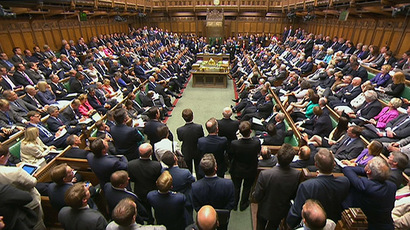‘Domestic extremists’: Police face legal action after spying on journalists for years
A group of journalists are taking legal action after they discovered the Metropolitan Police had been systematically monitoring their movements and behavior on a secret database designed to capture “domestic extremism.”
Following revelations from freelance photojournalist Jason Parkinson, who gained access to his files through a public records request, the group of six journalists have begun a challenge to legally expose what they are calling a “persistent pattern” of journalists being assaulted, monitored and searched.
“Domestic extremism” became a common term used by police in 2009 when they attempted to quell supposedly criminal activities at peaceful protests.
There is no technical or legal definition of the term, but police continue to operate under its auspices claiming domestic extremists are individuals or groups “that carry out criminal acts of direct action in furtherance of a campaign.”
In January 2014, freelance video journalist Jason Parkinson received 12 pages of documentation, covering nine years of his life. Parkinson says the police intelligence logs which protests he covered, whom he spoke to, and even what he wore.
“Police officers we'd never even met before knew our names and seemed to know a hell of a lot about us,” he said.
The lawsuit is being filed by the National Union of Journalists (NUJ) against both the Metropolitan Police and the Home Office.
Another journalist affected by police surveillance is Times reporter Jules Mattsson. His police records note that he is “always looking for a story.”
Mattsson said police had transferred his personal details, as well as his childhood and family members’ medical history, onto the “domestic extremist” database after he was a victim of a crime.
He said, “No one could possibly defend this.”

Five of the six journalists pressing charges have already been successful in previous cases, having been awarded damages or compensation for being assaulted or unreasonably searched by police while working.
The group are seeking to have the files, released through the Data Protection Act, destroyed after complaints that many on the database do not have a criminal record.
In some individual reports, there are over 130 separate entries of journalists being monitored and recorded.
“This is another extremely worrying example of the police monitoring journalists who are undertaking their proper duties,” said Paul Lashmar, head of journalism at Brunel University.
In October, a Freedom of Information (FoI) request found police have more than 2,000 references to journalists and photographers in their files.
READ MORE: Tory vow to protect journalists’ rights rubbished by human rights organizations
Commissioner of the Metropolitan Police Bernard Hogan-Howe told MPs last week his officers did not “routinely collect” information on journalists and their sources.
He claimed that the police would only investigate individuals if they were either victims or suspects.
His announcement followed an amendment to the Crime Bill on October 23, which means police can now no longer follow journalists’ phone records to reveal their sources without permission from a judge.
Michelle Stanistreet, NUJ General Secretary, condemned the police surveillance practice.
“There is no justification for treating journalists as criminals or enemies of the state,” she said.














